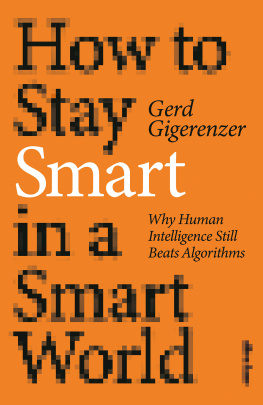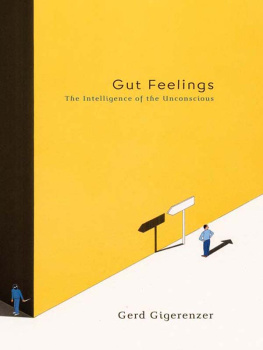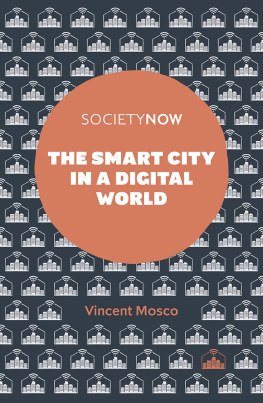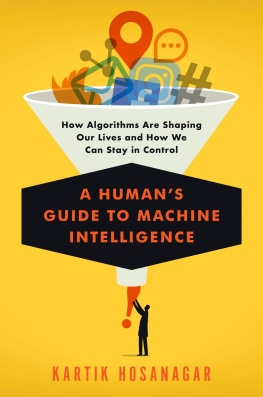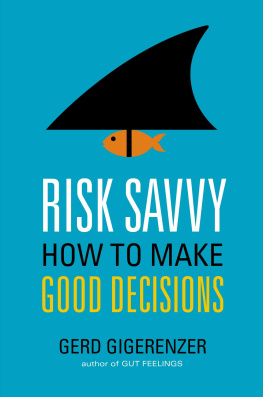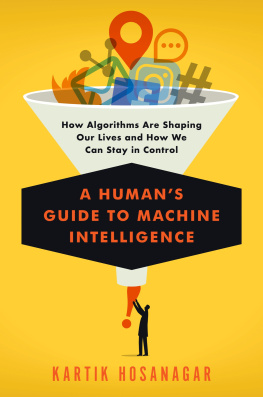Gerd Gigerenzer
HOW TO STAY SMART IN A SMART WORLD
Why Human Intelligence Still Beats Algorithms

PENGUIN BOOKS
UK | USA | Canada | Ireland | Australia
New Zealand | India | South Africa
Penguin Books is part of the Penguin Random House group of companies whose addresses can be found at global.penguinrandomhouse.com.

First published in Germany by C. Bertelsmann Verlag 2021
First published in Great Britain by Allen Lane 2022
Copyright Gerd Gigerenzer, 2022
The moral right of the author has been asserted
Cover design by Richard Green
ISBN: 978-0-141-99505-2
This ebook is copyright material and must not be copied, reproduced, transferred, distributed, leased, licensed or publicly performed or used in any way except as specifically permitted in writing by the publishers, as allowed under the terms and conditions under which it was purchased or as strictly permitted by applicable copyright law. Any unauthorized distribution or use of this text may be a direct infringement of the authors and publishers rights and those responsible may be liable in law accordingly.
For Athena
Introduction
Daddy, when you were young, before computers, how did you get into the Internet?
A seven-year-old in Boston
If robots do everything, then what are we going to do?
A five-year-old in a Beijing kindergarten
Imagine a digital assistant who does everything better than you. Whatever you say, it knows better. Whatever you decide, it will correct. When you come up with a plan for next year, it will have a superior one. At some point you may give up making any personal decisions on your own. Now its the AI that efficiently runs your finances, writes your messages, chooses your romantic partner and plans when its best to have children. Packages will be delivered to your door with products you didnt even know you needed. A social worker may turn up because the digital assistant predicted that your child is at risk of severe depression. And, before you waste time agonizing over which political candidate you favour, your assistant will already know and cast your vote. Its just a matter of time until tech companies run your life, and the faithful assistant morphs into a supreme superintelligence. Like a flock of sheep, our grandchildren will cheer or tremble in awe of their new master.
In recent years, I have spoken at many popular artificial intelligence (AI) events and am repeatedly surprised at how widespread unconditional trust in complex algorithms appears to be. No matter what the topic was, representatives of tech companies assured listeners that a machine will do the job more accurately, quickly and cheaply. Whats more, replacing people by software might well make the world a better place. In the same vein, we hear that Google knows us better than we know ourselves and that AI can predict our behaviour almost perfectly, or soon will be able to do so. Tech companies proclaim this ability when they offer their services to advertisers, insurers or retailers. We too tend to believe it. Even those popular authors who paint doomsday pictures of robots ripping the guts out of humans assume the near-omniscience of AI, as do some of the tech industrys most outspoken critics who brand the business as evil surveillance capitalism and fear for our freedom and dignity. It is this belief that makes many worry about Facebook as a terrifying Orwellian surveillance machine. Data leaks and the Cambridge Analytica scandal have amplified this worry into fearful awe. Based on faith or fear, the storyline remains the same. It goes like this:
AI has beaten the best humans in chess and Go.
Computing power doubles every couple of years.
Therefore, machines will soon do everything better than humans.
Lets call it the AI-beats-humans argument. Its two premises are correct, but the conclusion is wrong.
The reason is that computing power goes a long way for some kinds of problems, but not for others. To date, the stunning victories of AI have been in well-defined games with fixed rules such as chess and Go, with similar successes for face and voice recognition in relatively unchanging conditions. When the environment is stable, AI can surpass humans. If the future is like the past, large amounts of data are useful. However, if surprises happen, big data which are always data from the past may mislead us about the future. Big data algorithms missed the financial crisis of 2008 and in 2016 predicted Hillary Clintons victory by a large margin.
In fact, many problems we face are not well-defined games but situations in which uncertainty abounds: finding true love, predicting who will commit a crime and reacting in unforeseen emergency situations are examples. Here, more computing power and bigger data are of limited help. Humans are the key source of uncertainty. Imagine how much more difficult chess would be if the king could violate the rules at a whim and the queen could stomp off the board in protest after setting the rooks on fire. With people involved, trust in complex algorithms can lead to illusions of certainty that become a recipe for disaster.
To appreciate that complex algorithms are likely to succeed when situations are stable but will struggle with uncertainty exemplifies the general theme of this book, staying smart in a smart world:
Staying smart means understanding the potentials and risks of digital technologies, and the determination to stay in charge in a world populated by algorithms.
I wrote this book to help you understand the potential of digital technologies, such as AI, but even more important, the limitations and risks of these technologies. As these technologies become more widespread and dominant, I want to provide you with strategies and methods to stay in charge of your life rather than let yourself get steamrollered.
Should we simply lean back and relax while software makes our personal decisions? Definitely not. Staying smart does not mean obliviously trusting technology; nor does it mean anxiously mistrusting it. Instead, it is about understanding what AI can do and what remains the fancy of marketing hype and techno-religious faiths. It is also about ones personal strength to control a device rather than being remote-controlled by it.
Staying smart is not the same as digital skills for using technology. Educational programmes worldwide seek to increase digital skills by buying tablets and smart whiteboards for classrooms and teaching children how to use them. But these programmes rarely teach children how to understand the risks delivered by digital technology. As a consequence, most digital natives shockingly cannot tell hidden ads from real news and are taken in by the appearance of a website. For instance, a study of 3,446 digital natives showed that 96 per cent of them do not know how to check the trustworthiness of sites and posts.
A smart world is not just the addition of smart TVs, online dating, and gimmicks to our lives. It is a world transformed by digital technology. When the door to the smart world was first opened, many pictured a paradise where everyone had access to the tree of truthful information, which would finally put an end to ignorance, lies and corruption. Facts about climate change, terrorism, tax evasion, exploitation of the poor and violations of human dignity would be laid open. Immoral politicians and greedy executives would be exposed and forced to resign. Government spying on the public and violations of privacy would be prevented. To some degree, this dream has become reality, although the paradise has also been polluted. What is really happening, however, is a transformation of society. The world does not simply get better or worse. How we think about good and bad is changing. For instance, not long ago, people were extremely concerned about privacy and took to the streets to protest against governments and corporations that tried to surveil them and get hold of their personal data. A wide spectrum of activists, young liberals and mainstream organizations held massive protests against the 1987 German census, fearing that computers could de-anonymize their answers, and angry people plastered the Berlin Wall with thousands of empty questionnaires. In the 2001 census in Australia, more than 70,000 people declared their religion as Jedi (after the movie

